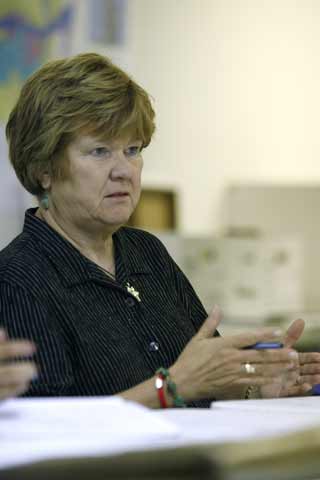Home Rule falls into Charleston voters’ hands
Charleston voters could decide the fate of home rule in the city, following a unanimous recommendation from the Home Rule Ad-Hoc Committee Tuesday night.
A decision to ask voters if they would support home rule status is now in the hands of the Charleston City Council. Charleston voters would have to approve of home rule status through a referendum.
Committee members said the question of home rule, which would increase the power of city government to tax and regulate, should be publicly debated.
“I’m not an endorser (of home rule),” said committee member James Wood. “I’m just saying that the issue should go to the public.”
Wood said home rule would increase city revenues and reduce restrictions on how those revenues are spent.
“We would be able to use revenues we already get, like the hotel/motel tax, as we need,” said Eric Wilber, the Eastern student representative on the committee. “Right now we are limited in how we use that money.”
Wilber also said the city could raise sales taxes above current rates. Still, state law limits such increases to 0.25 percent increments.
The committee also discussed the possibility of a student surcharge fee for Eastern students living on campus, as well as new licensing fees as ways to increase city revenue.
The committee members decried both options as politically and economically unwise. Committee members also discussed the potential economic benefits of home rule, explaining that it would give the city more power to promote new business and support existing businesses.
“As far as economic development is concerned, students would be 100 percent behind that,” Wilber said. “You hear students say ‘There’s nothing to do.’ They would support bigger businesses and restaurants.”
Other members were more guarded.
“Some of this economic development.can be done without Home Rule, but they can’t be done as easily,” Wood said.
Members of the public present disagreed.
“It’s a stupid idea,” said Charleston resident Jonathan Kaye. “We can do (economic development) without it.”
Home rule communities are also given more authority to create and enforce health and safety regulations. In Charleston, that could mean closer controls on rental property according to committee members.
“For the students, we would love rental inspections,” said Wilbur. “On the other hand, some of the landlords wouldn’t like that.”
Joe Astrouski can be reached at 581-7942 or at jmastrouski@eiu.edu.
Home Rule falls into Charleston voters’ hands

Committee member and Charleston resident Mary McShane discusses the advantages and disadvantages of the home rule proposal with the rest of the Home Rule Ad-Hoc Committee at Tuesday night’s meeting at City Hall. (Robbie Wroblewski/Daily Eastern News)





































































